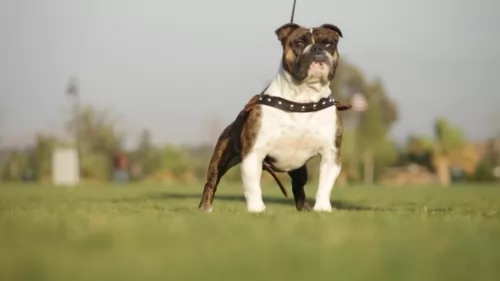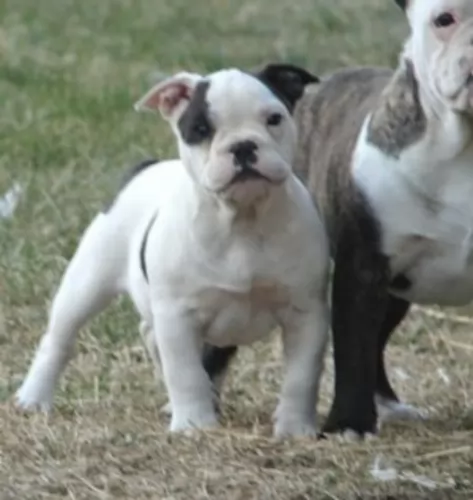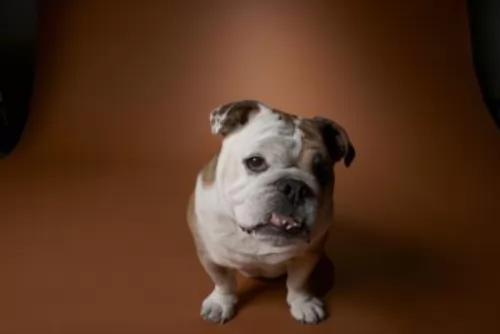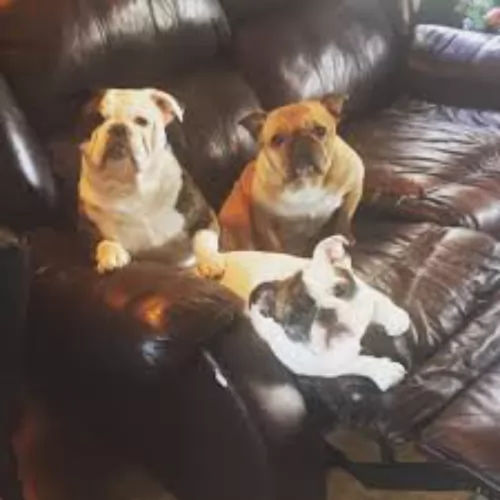 Petzlover
Petzlover Bantam Bulldog is originated from United Kingdom but English Coonhound is originated from United States. Bantam Bulldog may grow 33 cm / 12 inches shorter than English Coonhound. Bantam Bulldog may weigh 10 kg / 22 pounds lesser than English Coonhound. Both Bantam Bulldog and English Coonhound has almost same life span. Both Bantam Bulldog and English Coonhound has same litter size. Both Bantam Bulldog and English Coonhound requires Low Maintenance.
Bantam Bulldog is originated from United Kingdom but English Coonhound is originated from United States. Bantam Bulldog may grow 33 cm / 12 inches shorter than English Coonhound. Bantam Bulldog may weigh 10 kg / 22 pounds lesser than English Coonhound. Both Bantam Bulldog and English Coonhound has almost same life span. Both Bantam Bulldog and English Coonhound has same litter size. Both Bantam Bulldog and English Coonhound requires Low Maintenance.
 The origin of the Bantam Bulldog goes back to the 1800s, and in fact there is evidence of miniature bull dogs in 1899, In 1902 the smaller bulldog breed was facing extinction, so that it became necessary to import French bulldogs to England to help restore the bantam bulldog breed.
The origin of the Bantam Bulldog goes back to the 1800s, and in fact there is evidence of miniature bull dogs in 1899, In 1902 the smaller bulldog breed was facing extinction, so that it became necessary to import French bulldogs to England to help restore the bantam bulldog breed.
It was only in 2002 that the United Canine Association recognized the English bantam bulldog.
They’re the same as the ordinary bulldog except they are lighter and shorter, although there are slightly larger ones which are as tall as a regular bulldog.
The Bantam bulldogge is related to the English and French bulldogs so that the standards for the bantam breed has similarities to both types.
 The interesting thing about the English Coonhound is that he originated in the United States, in the southern states. It is also called the American English Coonhound and recognized as such by the AKC. Its ancestry however is British coming from the hunting hounds- the Foxhounds- that were brought to the United States from England in the 17th and 18th centuries and were the base for the Virginia Hounds. These hounds came from dogs that were imported for George Washington, Thomas Walker and Robert Brooke. These Virginia Hounds were then developed into the English Coonhound.
The interesting thing about the English Coonhound is that he originated in the United States, in the southern states. It is also called the American English Coonhound and recognized as such by the AKC. Its ancestry however is British coming from the hunting hounds- the Foxhounds- that were brought to the United States from England in the 17th and 18th centuries and were the base for the Virginia Hounds. These hounds came from dogs that were imported for George Washington, Thomas Walker and Robert Brooke. These Virginia Hounds were then developed into the English Coonhound.
A dog was needed that could handle the rougher terrain of the United States and hunt American Red Fox and racoons. Interestingly it was England, through the UKC, that first recognized the breed in 1905, labeling it the English Fox and Coonhound. The AKC recognized it in 2011.
Development of this group of hounds continued when the Treeing Walker Coonhound was split off as its own breed in 1945, and the Bluetick Coonhound followed in 1946. The English Coonhound can tree a prey or corner it until the hunter arrives. They hunt in packs or they can work one on one with the hunter. Either way they excel at finding and holding their prey “at bay”.
 The breed has its origins with the English bulldog, but it was in 2011 that the ‘English’ was abandoned and the name of the dog changed to Bantam Bulldogge. Short to medium in height, and with his large, square head and broad, short muzzle, the dog is short, strong, stout and compact. He had wide apart eyes, short, half-pricked, half-floppy ears and the front legs are also strong and set wide apart.
The breed has its origins with the English bulldog, but it was in 2011 that the ‘English’ was abandoned and the name of the dog changed to Bantam Bulldogge. Short to medium in height, and with his large, square head and broad, short muzzle, the dog is short, strong, stout and compact. He had wide apart eyes, short, half-pricked, half-floppy ears and the front legs are also strong and set wide apart.
He is fit and active with a playful, jovial personality. The Bantam Bulldog is completely at ease with his human family and welcomes visitors to the home. He forms strong bonds with everyone in the family and loves the presence of children in the home too. As with most other dog breeds, he does well with training and socialization – it just makes him a better dog all round. He doesn’t have a problem with accepting other pets in the home.
The coat of the Bantam is short, dense and straight with the skin being tight to the body but looser around the head and neck. Both head and face have moderate wrinkles. The coat is available in all colors and is low maintenance. A good brush twice a week won’t only remove loose hairs and keep his short coat glossy, the mere act of brushing him strengthens the bond between you as well.
 The English Coonhound is a medium sized dog with a domed head and a deep chest. His build is very athletic. He has dark eye and low-hung ears. The coats of the English Coonhound are extremely variable. For the most part there are three distinct types – the Redtick, the Tricolor and the Bluetick. They can be in any of these categories and have ticking of any color. The most predominate of this group is the Red. So, predominate is the red that the breed is often called the Redtick Coonhound by many.
The English Coonhound is a medium sized dog with a domed head and a deep chest. His build is very athletic. He has dark eye and low-hung ears. The coats of the English Coonhound are extremely variable. For the most part there are three distinct types – the Redtick, the Tricolor and the Bluetick. They can be in any of these categories and have ticking of any color. The most predominate of this group is the Red. So, predominate is the red that the breed is often called the Redtick Coonhound by many.
 The Bantam Bulldog is full of personality and is active, friendly and social. He is an adaptable pet and will happily live with his human family in an apartment or in a home with a garden. Patient and tolerant, he responds well to the voice of his owner and simple commands are no problem with him as he is quick to learn and to please.
The Bantam Bulldog is full of personality and is active, friendly and social. He is an adaptable pet and will happily live with his human family in an apartment or in a home with a garden. Patient and tolerant, he responds well to the voice of his owner and simple commands are no problem with him as he is quick to learn and to please.
He is never going to be much of a guard dog for you, but he will be a happy, contented, loyal and devoted companion who just wants to be as close to you as he can.
 The English Coonhound is quiet when at home and loud when hunting. They love to cuddle up on a couch and they are great pets. However, they still have a very high prey drive and need a lot of exercise as previously mentioned. They love kids and will be very loyal, hoping to please you all the time. They are curious and if left alone can be destructive. They can also be stubborn and strong willed, and they will howl when caged. If you are going to crate them, train them to it from 3 months on.
The English Coonhound is quiet when at home and loud when hunting. They love to cuddle up on a couch and they are great pets. However, they still have a very high prey drive and need a lot of exercise as previously mentioned. They love kids and will be very loyal, hoping to please you all the time. They are curious and if left alone can be destructive. They can also be stubborn and strong willed, and they will howl when caged. If you are going to crate them, train them to it from 3 months on.
 A happy dog is a healthy dog, but the happy Bantam Bulldog will be prone to certain ailments that are common to his breed
A happy dog is a healthy dog, but the happy Bantam Bulldog will be prone to certain ailments that are common to his breed
This breed of dog is prone to have hip dysplasia. Because of their genetic make-up, the soft tissues surrounding the joint develop abnormally and the disease can affect one- or both hips.
Bulldogs can also be prone to digestion issues which amounts to flatulence. This problem however, can be reduced significantly by giving your pet the best diet. Speak to your vet about appropriate foods for dogs with a sensitive stomach. With a sensitive stomach, you want to avoid dog foods with toxic colorants, artificial preservatives and artificial flavors.
Be aware of breathing problems with your bantam bulldog because flat-faced dog breeds such as this can battle with upper airway problems. Symptoms of an obstructed upper airway can include noisy breathing, panting, snoring, rapid breathing and coughing.
 The English Coonhound is an exceptionally hardy breed. The only serious situation they regularly face is Bloat. Bloat appears when the dog eats a large meal too fast after exercising or eats too large a meal before exercising. What happens in bloat is the stomach is distended and the intestine can wrap around vital organs and kill the dog.
The English Coonhound is an exceptionally hardy breed. The only serious situation they regularly face is Bloat. Bloat appears when the dog eats a large meal too fast after exercising or eats too large a meal before exercising. What happens in bloat is the stomach is distended and the intestine can wrap around vital organs and kill the dog.
Breeders do test for elbow and hip dysplasia but the is not a lot of this in the breed.
 Your Bantam Bulldog needs a lot of protein in his diet. In fact, the Association of American Feed Control Officials have suggested that the dog needs at least 22% of maintenance protein for puppies and 18% of protein for adult dogs. Speak to your vet about wet- and dry dog foods and which foods will suit this particular pet of yours. Always ensure cool, fresh water is within your pet’s reach.
Your Bantam Bulldog needs a lot of protein in his diet. In fact, the Association of American Feed Control Officials have suggested that the dog needs at least 22% of maintenance protein for puppies and 18% of protein for adult dogs. Speak to your vet about wet- and dry dog foods and which foods will suit this particular pet of yours. Always ensure cool, fresh water is within your pet’s reach.
The exercise needs of the Bantam Bulldog are minimal. He is never going to turn down a game of ball with the kids but you don’t have to take him on long walks or runs. He is a social pet, so even though you don’t have to be putting him through an exercise program every day, he doesn’t want to be left alone hour after hour, day after day.
 When feeding your English Coonhound be aware that this athlete loves to eat. You have to keep him from growing obese as his tendency to overeat is high. He uses a lot of energy on the hunt so if he is a hunting dog perhaps he needs more calories. Be careful when and how you feed him so that he won’t get bloat.
When feeding your English Coonhound be aware that this athlete loves to eat. You have to keep him from growing obese as his tendency to overeat is high. He uses a lot of energy on the hunt so if he is a hunting dog perhaps he needs more calories. Be careful when and how you feed him so that he won’t get bloat.
As previously mentioned the American English Coonhound is a very hearty breed and its most serious issue is Bloat. However, they also have long, floppy ears.
Because they were bred to hunt they need a lot of daily exercise. Jogging, brisk walking, or playing at t dog park are good activities for him. If they don’t get enough energy they become high strung and can engage in destructive behavior. Don’t let them off leash as they might wander off after any scent they capture. They love to chase a ball and you’ll wear out before they do. He might be good at lure chasing.